- Home
- Edward Lee
Buttermilk Graffiti Page 8
Buttermilk Graffiti Read online
Page 8
“You are a writer?” he asks. He is clean shaven and graying, almost professorial but wearing the thin polyester of someone who works in a clerk’s office. He speaks with no accent, save the rhythm of a vernacular that is distinct from American English. It almost sounds British, though I know it is not.
“Not really,” I say, but I explain why I’m here.
“You are writing about Ramadan?”
“Not necessarily,” I respond, and immediately feel his scorn. “I don’t know much about it. Where would I learn?”
“You don’t learn Ramadan. You must experience it.”
“You telling me I should fast?”
“Why not?”
“I’m not Muslim.”
“You think fasting has to do with being Muslim?”
“Doesn’t it?”
“Fasting has to do with sympathy for the suffering, for humanity. If you think that is only a Muslim idea, then you are limiting yourself.”
Suddenly, I’m in a theological debate. I want to get up and leave, but like the speeding trucks along the dark highway, I’m being pulled toward something, this idea.
“What if I can’t do it? I mean, I’m here to eat.”
“That is up to you, Mr. Writer. No one will find fault in you. But what are you really trying to discover here?” He wishes me good luck and abruptly leaves. That “Mr. Writer” line seemed a bit condescending, and it stings me, until I realize that he paid for my pastries without my knowing. I dip my fork into the dense baklava, already knowing it will be my last bite of food for a while.
I plan on waking up before sunrise to drink plenty of water and eat a hearty breakfast. Instead, I oversleep. I wake to a blade of sunlight piercing my room. I’m hungry and parched. I get out of bed bleary-eyed, slowly walking on stiff ankles. I walk over to the sink, cup in hand, and fill it with cold tap water to soothe the aridity of my tongue. With my eyes half open, I bring the cup to my lips and then remember the man from last night, his tone, his condescension. I am alone; no one knows or cares about my promise. I can get a late start this morning; no one will know. I’m not Muslim, anyway. Then I hear his ironic voice calling me “Mr. Writer.” I put the cup down and lie back in bed, trying to collect enough saliva to coat my tongue. It is 9:00 a.m. I have more than twelve hours to go before sundown. I’m kinda fucked. I decide I’ll take this down the road as long as I can.
I start the day at a mosque, the Islamic Center of America. It is the largest and oldest mosque in America. It is a flawless structure of white stone and gold domes surrounded by immaculate lawns in the middle of perhaps the most nondescript city in America. It is a humbling building, like most monuments of prayer, and, as I walk into this vast marbled foyer, spotless, cold, and empty. I can hear the chants of prayers nearby, but otherwise, I’m alone in a hall where even my breathing is an echo. I hear a latch buzz open, and I’m met by a woman in her forties who has emerged from an office wearing the traditional hijab. She asks me if I would like a Koran, and we walk across the grounds. She doesn’t question why I’m here. She tells me to respect the book of the Koran. I tell her I have never read the Koran other than a few passages from an art history class in college. She smiles warmly and speaks in a patient voice. She does not lecture me about Islam. She tells me that to fast is to suffer as the poor do. Surprisingly, we talk about things that don’t seem like religion. She tells me about her daughter and asks me if I have children. I ask her about the shooter in Orlando.
He is not Muslim, she says. One cannot be Muslim and do those things.
She takes me into the prayer room, a cavernous space of ancient carpets and people kneeling in prayer. I take off my shoes and kneel in one corner. She tells me she must pray and that we can resume our talk later. She moves to the center of the room and kneels while reciting lines from the Koran. After a few minutes, a man taps me on the shoulder and points at me to follow him out of the room.
You are not Muslim, he tells me; you should not be in there. His voice is soft but stern. She will pray for a long time, he adds. You can talk to me.
We walk together toward the parking lot. We sit on a bench, and he tells me about the history of this mosque, the times it has been desecrated, the many times people have traveled to Dearborn only to protest here. He stops there, as if to acknowledge that he has nothing to explain, that he doesn’t need to defend himself against a crime he didn’t commit. He gives me a list of restaurants to visit and wishes me good luck. I forget to ask him his name. In my effort not to pry too much, I find it difficult even to ask the simplest of questions of the people I meet.
The next place I visit is a tiny Iranian kebab restaurant. There’s simmered lamb’s head on the menu. I order that and three other plates. I wait patiently for the food. When it arrives, I smell it, make some notes, and take the obligatory cell phone pics. The lamb’s head is ungarnished; it is simply a plate of tender meat sliding off the skull of a young sheep. I ask for to-go boxes. The owner looks at me curiously, and I tell her I’m observing Ramadan but want to write about the food, so I’ll eat it later tonight. Her hard face instantly warms with a smile. She is a large woman with the wrinkles of a person who has endured much. Her English is made up mostly of nouns. She wants to know where I’m from. She packs up my food lovingly and gives me plastic bags tied up in a knot, so it’ll be easy for me to carry. She calls her husband over; he shakes my hand. He is wearing nothing but a T-shirt, slacks, and flip-flops. He welcomes me into his space. He does all the cooking in a kitchen so small that I can’t fathom where his mise en place is. He doesn’t smile much, but I sense that he doesn’t smile much for anyone. We talk for some time, and he gives me a few suggestions for places I should try.
I go to a few more lunch spots and do the same thing. I’m so excited to be talking to people that I barely feel hunger. One of the places everyone keeps telling me about is Al Sultan, on Inkster Road near the outskirts of Dearborn, a diner-like building wrapped in neon signage depicting a man on horseback wielding a sword. The airbrushed image is surreal, but the food is top notch. It’s 2:00 p.m., and I have four bags of take-out food in the backseat of my car fermenting in the summer heat. Then I go to a place that has live chickens they slaughter to order for you. I don’t have the heart to get a chicken, but I walk out of there with a mango custard I know will only spoil in my car. I have about six hours to go before I can have my first taste of food, and so far, aside from being parched, I’m doing fine.
The day is flying by. I pull into a pastry shop and sidle up to a glass case filled with pastries. For some reason, the smell of burnt sugar triggers something in me that none of the meats did. It makes me weak. I start moving noticeably slower, more heavily. My brain sees the sugar, and I’m irritated. I leave without ordering anything. I jump into my car and I’m fucking mad. The car smells like a lamb carcass, and my air conditioner is out. I drive back to my hotel with Young Jeezy playing as loud as I can stand it.
I organize all the food in my refrigerator and lie down on the floor, which smells like carpet mites, whatever they’re supposed to smell like. My hunger dissolves again. I don’t know for how long, so I start reading through e-mails I’ve already read. I fall asleep pretty quickly.
When I wake up, it’s around 5:00 p.m. I am only four and a half hours away from food. The hunger is less painful than my parched mouth. I know that I shouldn’t be in this much discomfort; it is only one day of fasting, and plenty of people do this for a month without complaint. But for someone who is accustomed to consuming three thousand calories a day, this is a shock to the system. Judge Judy is on TV, and the sound of her voice comforts me. I start talking aloud about the specific pains I’m having.
“Stomach not so bad, actually, but my arms and legs feel heavy and weak.
“I can feel myself breathing.”
I have a headache, not a sharp puncture of pain, but more like the constant noise of weeping wit
hout pause. The inside of my ears hurt, which I think is because I’m swallowing every few seconds, hoping for moisture but just pulling more dry air down my trachea. I touch my thumb to the rest of my fingertips, one hand at a time, again and again. I fall back asleep.
I wake up to a dim orange cloud. The sun is finally going down. I have not seen the sun like this in many years, in a way I’m so invested in. I’m sweating; more water is draining from my body. Yet I’m oddly invigorated, as if high. I’m not delirious, but I’m also not well. There is a point where the stomach ceases to growl and you can feel it shrinking. The sound of the TV hurts me. I can’t find the remote, so I have to crouch down and find the Power button. The vibration of color rakes across my face. It is 8:30 p.m. An hour to go. I go for a walk. This is less a decision than a way to fight inertia, my body trying to stay awake. Not knowing where to go, I pace the parking lot. The heat is too much. It has never bothered me before, but now it feels like a cloak on my back. I didn’t put on socks, and my feet hurt in my shoes. My legs are getting numb. I go back to my room and lie in bed, though this time I can’t sleep. My mind is racing, while my arms and legs remain lethargic. I try to write, but I can’t find any coherent words. I can feel myself just giving in, but to what? I know I won’t die, so what is my body trying to do? It is shutting down. My vision is getting blurry.
This is my twentieth hour without food or water. I’m not sure I can even walk straight, but staying here watching the clock is making me insane. I get in my car and drive. I find a Syrian restaurant that’s on my list. I’m looking for company more than food at this point. It’s only about fifteen minutes now until iftar, or the breaking of the fast. Tables are filling up with men; they seem calm. I talk to the owner and tell him what I’m doing. He’s from Syria and does all the cooking, while his wife helps with the service. He has silver hair and a dark tan. I order kebabs and hummus and pastries. He gives me a stare of disappointment.
The purpose of fasting is not to overeat at sundown, he says. You must remain humble, eat meagerly and slowly.
Oh great, I think. I’m about to chew off my arm and I’m supposed to be modest.
You can eat for a long time, he explains, but always in small bites. Start with tea, he suggests. Have a simple soup, some bread and chickpeas. It is in this moment that we can understand what it truly feels like to be one of the unfortunate. Also, if the first thing you eat is a kebab, it will give you a stomachache later.
At the precise moment of sundown, he places a cup of tea in front of me. I drink it . . . and it is as if I have never tasted mint before. It is so sharp, so singular. I’m actually not even hungry anymore. The tea calms me. I don’t devour the food. I have soup, a creamy soup that has only about three ingredients but is so delicious that I can’t stop eating it. I eat unleavened bread and chew slowly. I go back to my hotel. It is dark now. I unwrap all the spoils from the day. Twelve Styrofoam trays of food in all. I take a bite from each one and jot down impressions in my notepad.
It is hard to judge a plate of food when you eat it hours after you’re supposed to, but the arayes from Al Sultan is remarkable, a flatbread-type sandwich stuffed with minced lamb and vegetables. I am sure it was much better hot, right off the grill. Even at room temperature, though, this is easily my new favorite sandwich. You have to make the dough from scratch; it is amazingly easy. It just isn’t the same using store-bought pita.
That night, sleep comes easily.
I’m able to keep up the fast for three more days. Each day, I meet more people who allow me into their lives. I feel the suspicion dissolve away. I get invited to iftar by a couple who owns a pastry shop. I eat pita with labneh and fritters. I’m taken aback by the labneh for its simplicity and yet also for how it wakes up my taste buds. Now that my mind is not focused on the pain of fasting, my senses feel heightened, my taste buds sharp. I don’t even eat the lamb. I’m transfixed by the flavor of warm pita and labneh.
The pita is homemade, the pastry chef says.
Of course it is. I feel like I’m eating something that is not just a family recipe or a tradition back home, but something deeper, more ancient. The sour notes of the labneh taste like an ancient flavor bringing relief after a day’s abstinence. How much has this cuisine changed over the last fifty, one hundred, two hundred years? Muslims have been in Dearborn for more than a hundred years, yet this city still walks a fine balance between hushed uneasiness and calm, tension and tolerance. Most of the people I meet have been here all their lives. They speak perfect English; they study in universities and drive American cars. But they are also deeply devout and deeply loyal to their religion and to Dearborn.
On my last day, I pack my car with food and drive back home. I invite friends over, and we feast on the delicacies while I tell stories about my fast. It sounds like a dream. No one believes me. I promise to keep the fast going, but I don’t last even another day. The next morning, I wake up and stuff a biscuit in my face while getting my daughter dressed for day care. Without the context of Dearborn, the fast becomes impossible. Without the community of people engaged in the same ritual, it seems facile. I look at my notebooks. Usually, I fill pages and pages with notes. Oddly, I didn’t write much on this trip. I forgot to get names; I didn’t collect menus. I realize that once I took myself out of the role of the observer and became a participant, I didn’t have the desire to write. I didn’t interview people; I just talked. I met many kinds of people but never thought to ask their names or interview them about their jobs. For a brief few days, I didn’t need explanations or testimonies. I just floated among others from a culture I would never truly understand, but I felt I got a little closer to understanding the food. I could taste the devotion, which is everywhere in the culture: the prayers, the fasting, the rituals. I’ve been eating hummus and tahini and falafel all my life, but for the first time, I understood why these foods feel so deeply enriching. After a day’s fast, the flavors and fats cling to your bones like medicine and heal you from the inside out.
Four months after my trip to Dearborn, I’m sitting in the recreation room of a local church on a Friday night. In response to the Orlando tragedy, I made a donation to a local LGBTQ organization that supports young teens discovering their identities. On this night, I talk to the group of kids about what I do, and we snack on some appetizers from my restaurant. They ask me questions, such as what my favorite food is and if I like to yell in my kitchen. We joke and laugh about our failures, and the whole time, we’re just talking about food. We don’t talk about the Orlando tragedy. I don’t ask them what troubles them. A fourteen-year-old girl plays me a song on her ukulele. I answer questions from the kids and from a box of questions written anonymously. We take selfies and trade Facebook accounts. The evening is lighthearted, though the cloud of violence is always nearby for these kids. I’m having a great time.
By most accounts, Henry Ford was a pretty bigoted man, one who believed more in the logic of mechanics than the humanity of people. I’ve never found any evidence that he was a gourmand. To care about food is to care about people. To understand the food of another culture is to know that there will be limitations. But there can still be a deep satisfaction in trying to understand a culture that will never understand you. I still have not read the entire Koran; I still know very little about Islam and the ancient cultures that gave rise to one of the most important cuisines we have in America. Still, I feel I’ve learned more about being human from attempting to fast. I learned to eat or not to eat in a city that is trying to preserve a culture that was born thousands of miles away and thousands of years ago. Maybe Dearborn is not your typical American city, and maybe we think the people there should eat more pizza and watch more South Park. Maybe we want them to be so much more assimilated than they want to be. But we love the hummus their culture created, and the falafel and the lamb kebabs and the yogurt sauces and the flatbreads. They give those to us freely, and they don’t complain when we make them our own
, when we put artichokes in our hummus or fill our pita breads with char siu pork.
Does everything have to be assimilated to be American? Can we learn to respect the distinct lines of a culture that does not want to be like us? I hope so, because as much as I love pizza and chanterelle hummus, I also want to know that I can go to a restaurant in Dearborn that will serve me a boiled lamb’s head, teeth and all, as if it were the most natural thing to eat for lunch.
Lamb Arayes with Tahini Dressing and Pickled Sweet Peppers
I learned about so many new dishes during my trip to Dearborn. I’m including this one because not only was it one of the tastiest dishes I ate, it also translates easily to a home kitchen. No special oven needed or long cooking times. This is basically a lamb sandwich in pita bread, but the lamb filling is aromatic and vibrant. And making the pita from scratch can be a transformative experience. I always make extra pita to enjoy with hummus the next day. Or crisp the leftovers in the oven and cut them into pieces to use in salads for a garnish.
Makes 4 sandwiches
lamb filling
One 1-pound piece lamb loin, finely chopped
1 cup chopped tomatoes
½ onion, finely diced
⅓ cup chopped fresh flat-leaf parsley
½ teaspoon ground allspice
¼ teaspoon ground cinnamon
1 teaspoon salt
½ teaspoon red pepper flakes

 In the Year of Our Lord 2202
In the Year of Our Lord 2202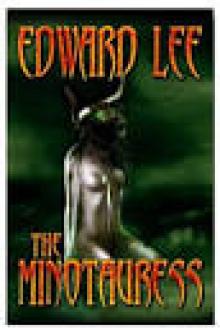 The Minotauress
The Minotauress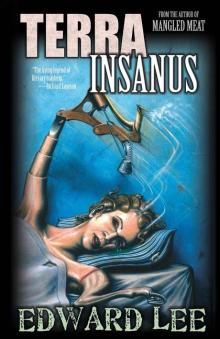 Terra Insanus
Terra Insanus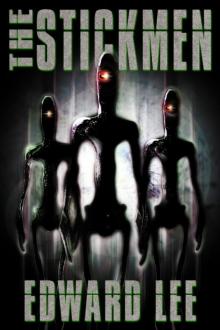 The Stickmen
The Stickmen Flesh Gothic by Edward Lee
Flesh Gothic by Edward Lee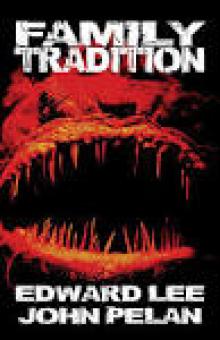 Family Tradition
Family Tradition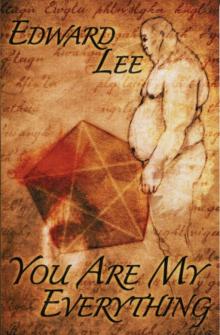 You Are My Everything
You Are My Everything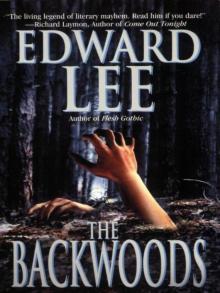 The Backwoods
The Backwoods The Teratologist
The Teratologist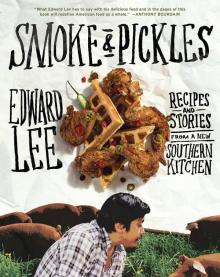 Smoke and Pickles
Smoke and Pickles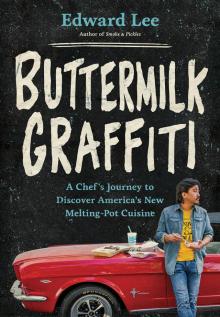 Buttermilk Graffiti
Buttermilk Graffiti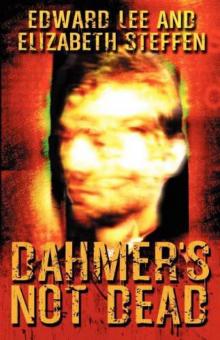 Dahmer's Not Dead
Dahmer's Not Dead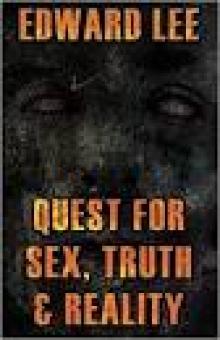 Quest for Sex, Truth & Reality
Quest for Sex, Truth & Reality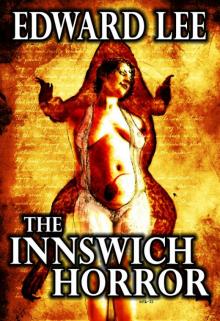 The Innswich Horror
The Innswich Horror Brides Of The Impaler
Brides Of The Impaler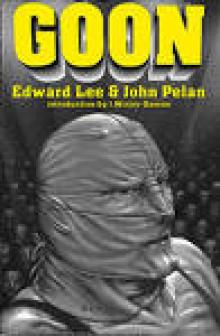 Goon
Goon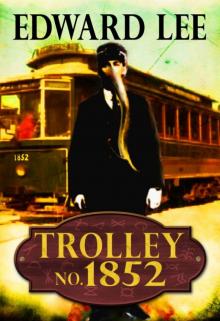 Trolley No. 1852
Trolley No. 1852 Sacrifice
Sacrifice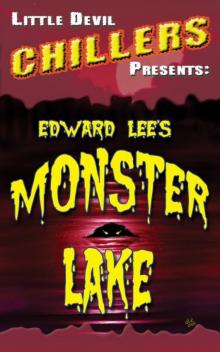 Monster Lake
Monster Lake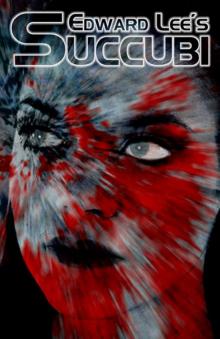 Succubi
Succubi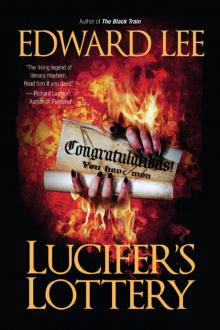 Lucifer's Lottery
Lucifer's Lottery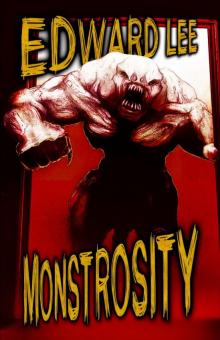 Monstrosity
Monstrosity The House
The House The Dunwich Romance
The Dunwich Romance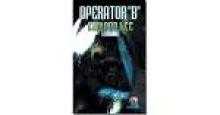 Operator B
Operator B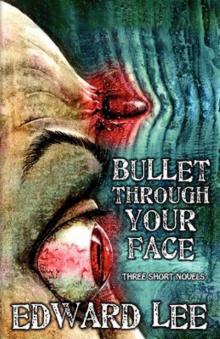 Bullet Through Your Face (improved format)
Bullet Through Your Face (improved format)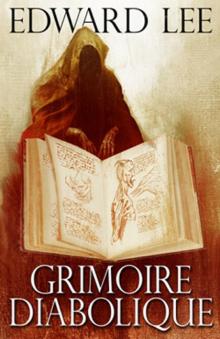 Grimoire Diabolique
Grimoire Diabolique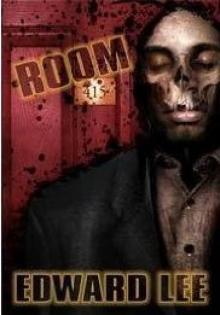 Room 415
Room 415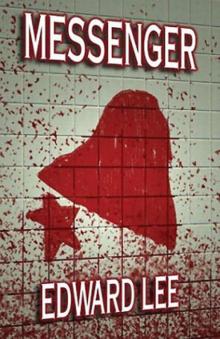 The Messenger (2011 reformat)
The Messenger (2011 reformat)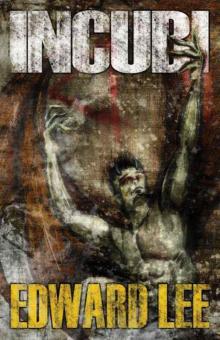 Incubi
Incubi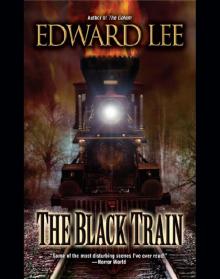 The Black Train
The Black Train House Infernal by Edward Lee
House Infernal by Edward Lee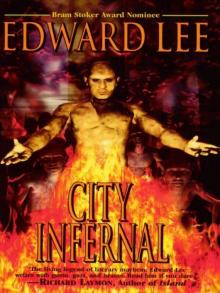 City Infernal
City Infernal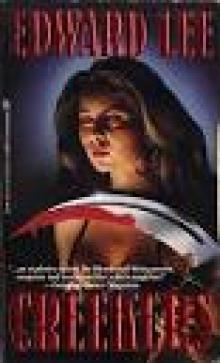 Creekers
Creekers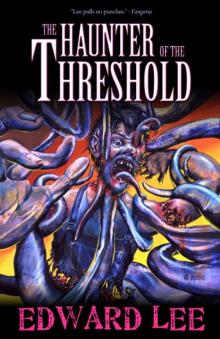 The Haunter Of The Threshold
The Haunter Of The Threshold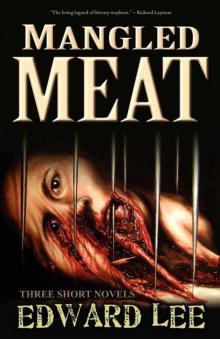 Mangled Meat
Mangled Meat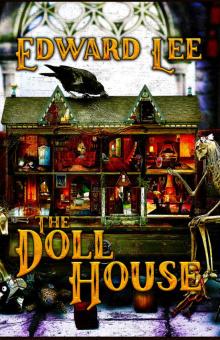 The Doll House
The Doll House Header 2
Header 2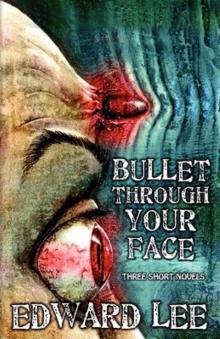 Bullet Through Your Face (reformatted)
Bullet Through Your Face (reformatted)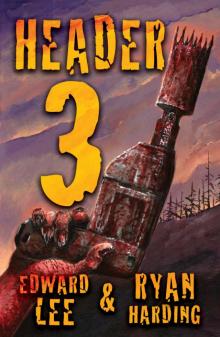 Header 3
Header 3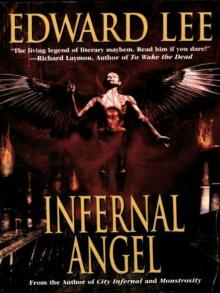 Infernal Angel
Infernal Angel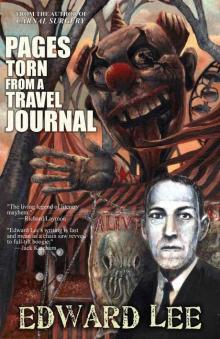 Pages Torn From a Travel Journal
Pages Torn From a Travel Journal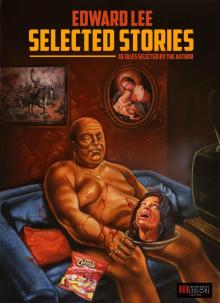 Edward Lee: Selected Stories
Edward Lee: Selected Stories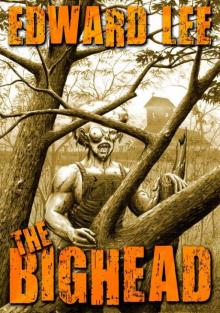 The Bighead
The Bighead The Chosen
The Chosen